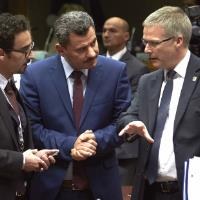(BRUSSELS) -The EU summit strongly condemned the continued assault on Aleppo by the Syrian regime and its Russian and Iranian allies Thursday, after a symbolic address by the mayor of East Aleppo Mr Brita Haj Hassan.
In its conclusions, the EU promised to exert pressure on global players present in Syria, calling for an immediate opening of humanitarian corridors to allow aid into Aleppo, and for civilians to be evacuated safely under neutral, international supervision. The EU has urged full, unrestricted access for all medical personnel and aid workers.
EU president Donald Tusk admitted, however, that “faced with the brutality of the Syrian regime and its supporters, notably Russia and Iran” the EU was not as effective as it would like.
Migration was high on the agenda of the one-day summit, with leaders stressing their commitment to implementing the ‘EU-Turkey Statement’, and discussing progress on implementation of so-called ‘compact’ agreements with five African countries of transit and origin.
The compacts are part of the EU’s comprehensive approach to reducing the illegal migration along the Central Mediterranean route. To achieve this, the EU helps African countries tackle the root causes of migration. It also works closely with them to improve return rates.
On Ukraine, the leaders tried to save the Association Agreement ratified by 27 Member States and the European Parliament but rejected by Dutch voters earlier this year. They adopted a legally binding decision to facilitate ratification in the Netherlands, which it says “addresses all the concerns expressed by the Dutch voters”.
The EU leaders only had a short, informal meeting on Brexit, finalised procedural arrangements and reiterating their negotiating principles, and declaring their readiness to start negotiations with the UK as soon as the UK makes its notification under article 50.
They repeated the principle of the indivisibility of the four key EU freedoms – a balance of rights and obligations, as president Donald Tusk put it, and their tough stance on the rule ‘no negotiations without notification’.
They also adopted an organisational structure for upcoming talks with the UK, with the European Council maintaining political control over the process and the Commission as the Union’s negotiator, and with Michel Barnier as the Union’s chief negotiator.
European Council conclusions, 15/12/2016
Brexit statement after the informal meeting of the 27 heads of state or government, 15 December 2016


